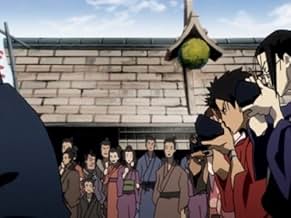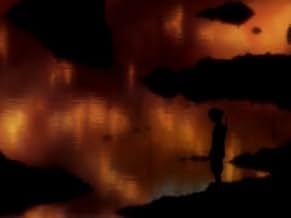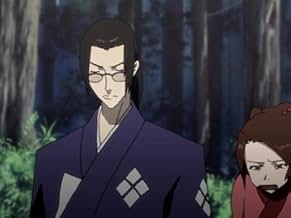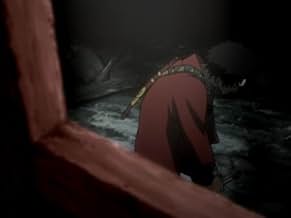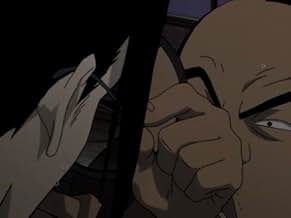Fuu, eine Kellnerin, die in einem Teehaus arbeitet, rettet zwei Meister-Schwertkämpfer, Mugen und Jin, vor ihrer Hinrichtung, um ihr zu helfen, den "nach Sonnenblumen duftenden Samurai" zu f... Alles lesenFuu, eine Kellnerin, die in einem Teehaus arbeitet, rettet zwei Meister-Schwertkämpfer, Mugen und Jin, vor ihrer Hinrichtung, um ihr zu helfen, den "nach Sonnenblumen duftenden Samurai" zu finden.Fuu, eine Kellnerin, die in einem Teehaus arbeitet, rettet zwei Meister-Schwertkämpfer, Mugen und Jin, vor ihrer Hinrichtung, um ihr zu helfen, den "nach Sonnenblumen duftenden Samurai" zu finden.
Folgen durchsuchen
Handlung
WUSSTEST DU SCHON:
- WissenswertesThe series was only allowed to be aired past 12:00 am in Japan for the network deemed it too graphic for prime time television.
- Alternative VersionenThe episodes aired on Adult Swim are edited for language and other content.
- VerbindungenFeatured in Troldspejlet: Folge #33.3 (2005)
Ausgewählte Rezension
With 1998's "Cowboy Bebop", one of the most acclaimed anime TV series ever (go read the comments index for it here on IMDb if you don't believe me!), Shinichiro Watanabe became a creative force to watch out for. The innovative energy, drama and beauty of "Bebop" are carried forward in his second original series, "Samurai Champloo". Fans have been quick to look for similarities between "Bebop" and "Champloo" (even the titles have clear parallels), and it's true there are some: the assembly-of-rootless-loners cast of characters, the dramatic and cinematic visual style, and especially the importance and integration of music into the storytelling mix--in SC's case, everything from hip-hop beatboxing to Ainu and Okinawan folksong. But "Champloo"'s differences from "Bebop" are much more interesting than its likenesses. "Bebop" is drenched in melancholy and regret, dreams of the lost past and the future that couldn't be. "Champloo" is all about facing the future, the wave of change, the onrush of history that can't be stopped, and how three kids from widely diverse backgrounds--not even friends when they set out-- find themselves right on the crest of that wave. We're in Edo Period Japan; since 1638 the Tokugawa Shogunate has banned contact with all countries except China and Japan, a ban that lasted two centuries. The outside world can't be kept outside forever. Even the long-respected samurai class is losing its power, and there's restlessness in the land plus accompanying pressure from the Shogunate on all sides. Through this uneasy landscape (rendered in lushly beautiful watercolors that might remind you of Miyazaki) wander our cast of characters: outlaw ronin Jin, a gifted swordsman, stoic, disciplined and heartbreakingly gorgeous, devoted to the bushido code but exiled for killing his sensei; Okinawan wild-boy Mugen, orphan, former pirate and brilliant innovator, whose fighting style mixes everything from Brazilian capoeira to break-dancing, and whose feral-child innocence faces the toughest tests in the series; and teahouse waitress Fuu, spunky, compassionate and packing a lot of secrets, who rescues the two swordsmen from the executioner's block and enlists them on her quest to avenge her mother's death. On their long walk from Edo to Nagasaki they'll see a lot, face a lot of trials, starve, quarrel, save each other's lives, break up, re-bond, and become inseparable. Except that Jin and Mugen still swear they'll fight to the death one day, and no one (not even Fuu) is saying anything about the Sunflower Samurai, the object of Fuu's quest.
Have I made this sound like a straight historical drama? I ought to mention that it can be hysterically funny as well as vividly bloody, contains knockout fight scenes and anachronisms by the carload (the aforementioned break dancing and beatboxing, Jin's Armani glasses, the appearance of landmarks not built till the 1900s...), has made me cry more times than any anime since "Bebop", and has sharp things to say about the heavy hand of authority and tradition on groups as diverse as gay men, married women, foreigners, aboriginal natives and illegal aliens. It's unfailingly beautiful to look at (well, 95% unfailingly) and listen to, delectably well-written, and simply brilliant. When it gets to America, go find it.
Have I made this sound like a straight historical drama? I ought to mention that it can be hysterically funny as well as vividly bloody, contains knockout fight scenes and anachronisms by the carload (the aforementioned break dancing and beatboxing, Jin's Armani glasses, the appearance of landmarks not built till the 1900s...), has made me cry more times than any anime since "Bebop", and has sharp things to say about the heavy hand of authority and tradition on groups as diverse as gay men, married women, foreigners, aboriginal natives and illegal aliens. It's unfailingly beautiful to look at (well, 95% unfailingly) and listen to, delectably well-written, and simply brilliant. When it gets to America, go find it.
- angelynx-2
- 19. Okt. 2004
- Permalink
Top-Auswahl
Melde dich zum Bewerten an und greife auf die Watchlist für personalisierte Empfehlungen zu.
- How many seasons does Samurai Champloo have?Powered by Alexa
Details
Zu dieser Seite beitragen
Bearbeitung vorschlagen oder fehlenden Inhalt hinzufügen







